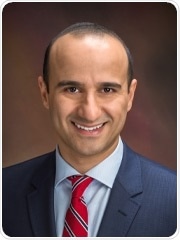Oct 4 2018
CHOP Scientist Proposes Interactive Info-Sharing Model, to Help Advance Precision Medicine
Maybe the genetic test report your doctor ordered says your DNA contains many “variants of unknown significance.” Currently, up to 70 percent of such reports are negative or inconclusive. But suppose at a later date a researcher discovers one of those changes causes a disease? You may be able to take preventive steps or receive early treatment—but how will you learn this new piece of information? You can’t even be sure your doctor will find out about it.

Mahdi Sarmady, PhD
A scientist in the Division of Genomic Diagnostics (DGD) at Children’s Hospital of Philadelphia (CHOP) proposes a new model to generate ongoing automated updates to account for new evidence--and enable genetic counselors and physicians to better communicate clinically relevant information to patients and families, not just when the test results are initially reported, but for years to come as new knowledge accumulates.
“Since the Human Genome Project was completed, the flood of new genetic information and the accelerated pace of discovery represent a paradigm shift in the practice of clinical genetics,” said Mahdi Sarmady, PhD, a genome informatics scientist and Director of Bioinformatics in the DGD. He points out, for instance, that clinical sequencing is increasingly being incorporated in pediatric clinics as a routine diagnostic tool.
To enable faster, more systematic use of sequencing results, Sarmady and Ahmad Abou Tayoun, PhD, a former CHOP geneticist now at Al Jalila Children’s Specialty Hospital in Dubai, U.A.E., propose a new model for genomic interpretation and continuous reanalysis in a Viewpoint article published online today in JAMA Pediatrics.
Under the traditional approach in clinical genetics, a physician or genetic counselor would order a laboratory test on a specific gene to determine whether a patient carried a known mutation linked to a genetic disease. Now labs offer gene panels to test all known genes associated with a specific disorder, or exome sequencing, to search all protein-coding genes in a person’s DNA.
But managing and interpreting the fire hose of data provided by new high-throughput sequencing methods has led to a bottleneck in keeping up with and delivering useful information to patients and clinicians.
The proposed model outlines a two-way exchange of information between laboratories and the clinic. Automated algorithms would collect new evidence from scientific literature and various knowledge bases of gene variants linked to specific disorders, and would notify a clinician that a patient’s previously discovered variant could be pathogenic. A physician or genetic counselor, for their part, could use an app in the platform to order reanalysis and to enter the most up-to-datephenotypic information on a patient’s health status—adding details about the course of a genetic disease, to inform other researchers and clinicians.
“Instead of a one-time test result, there would be continuous, systematic interaction between the clinic and the genetic testing lab, and reanalysis of changing data,” said Sarmady. “This could enable clinicians to provide better diagnoses and change treatment plans for their patients as new information becomes available, and help advance the promise of precision medicine.”